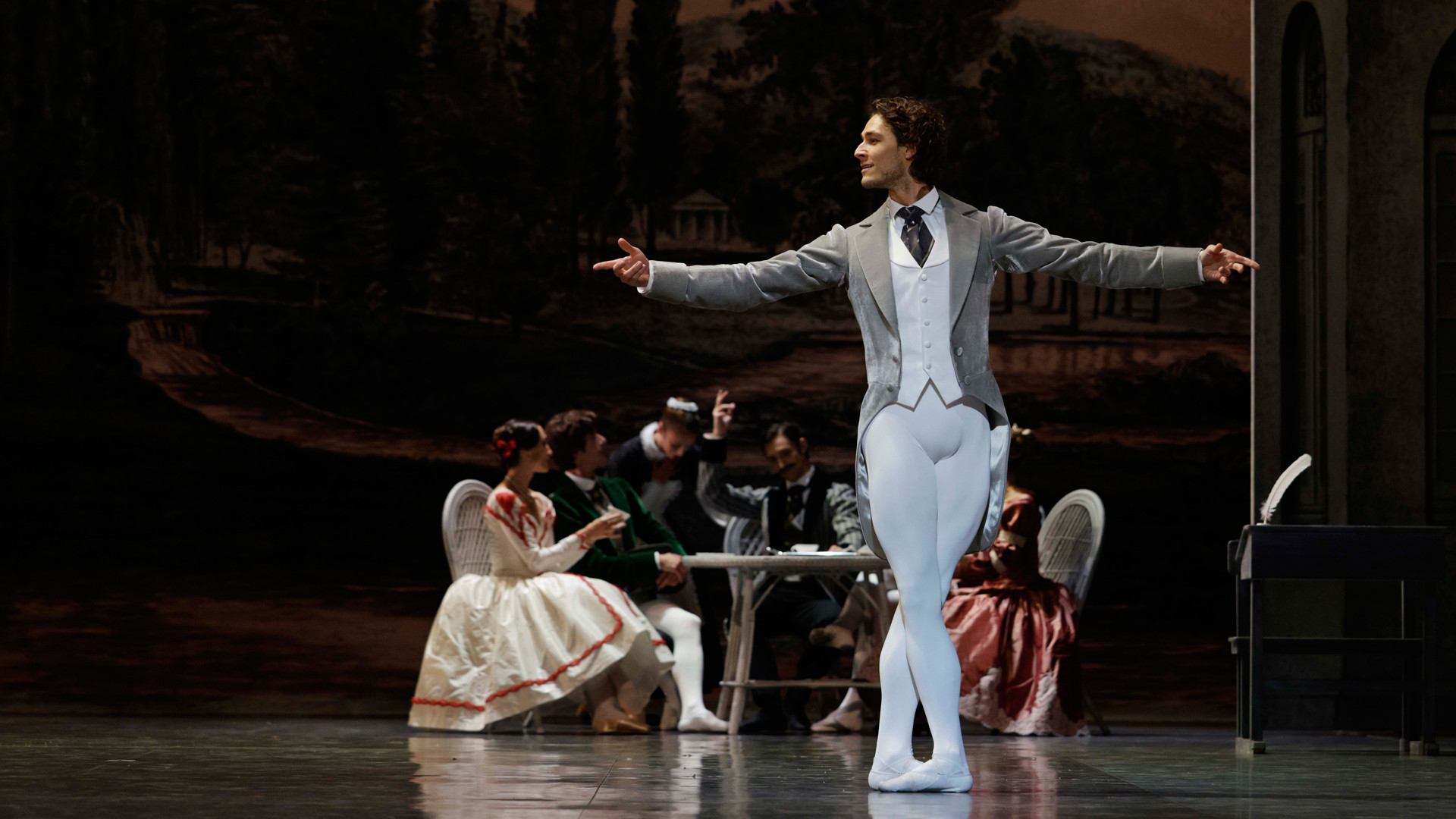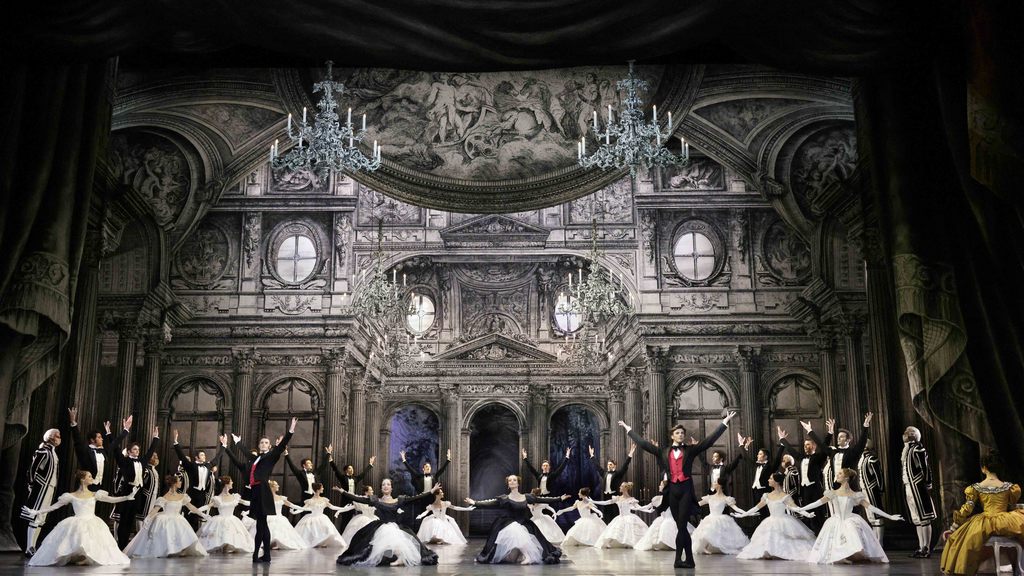

Actors
Julien Sorel
Madame de Rênal
Mathilde de la Mole
Élisa
Monsieur de Rênal
L'Abbé Chélan
Crew
In the 1830s, during the period of the Restauration, Julien Sorel, an irresistible young 18-year old, experiences a meteoric rise. A protégé of the abbé Chélan, he gains access to the world of the aristocracy and finds himself at the very heart of the struggle for power. The Red and the Black is the story of a tumultuous life in which love proves to be the most dangerous of passions. Madame de Rênal and Mathilde de La Mole lead the protagonist through the twists and intrigues of a 19th century in which desire, politics and religion form the backdrop for a brilliant character study. In sumptuous sets and costumes which he himself has conceived, Pierre Lacotte, who reconstituted La Sylphide, Paquita and Coppélia, now offers us an entirely new creation based on Stendhal’s novel of the same name, accompanied by a musical anthology from Jules Massenet.
Act I
In a provincial town (Verrières), Julien Sorel, a carpenter’s son, resolves to leave the family circle and the sawmill where he is employed in order to pursue his aspirations. The Abbé Chélan, having taken him under his protection, meets the mayor of the town, Monsieur de Rênal, in the street, who asks him to seek out a tutor for his children. In the Rênal family’s garden, the Abbé Chélan introduces them to Julien, who is taken on as a tutor. Élisa, the maid, falls madly in love with Julien and, feeling scorned, watches Julien seduce Mme de Rênal. She decides to write an anonymous letter to the Mayor. Hearing a knock at her bedroom door, Mme de Rênal rushes to hide Julien behind a screen, and then opens the door to her husband. Élisa, taking advantage of this opportunity, brings in the anonymous letter she has written to him. When the scandal erupts, the Abbé Chélan leads Julien out of the house, to the great despair of Madame de Rênal.
Act II
In the seminary where the Abbé Chélan is hiding Julien, the memory of Madame de Rênal haunts the young man’s nights. The novices’ new “director of conscience”, the Abbé Castanède, takes a dislike to Julien. Sensing the persecution that Julien risks, the Abbé Chélan decides to remove him from the seminary and takes him to Paris. He introduces Julien to the Marquis de la Mole who engages him as his private secretary. His daughter Mathilde, proud and haughty, does not want to accept the feelings she suddenly develops for Julien. During a ball, irritated by Julien’s flirting with the Maréchale de Fervaques, she writes him a note summoning him to her room. Julien realises that she is an ideal means of gaining a position in the aristocratic society in which he is living.
Act III
Julien goes to Mathilde’s room where the young woman surrenders to him. Julien’s pride seduces the Marquis’ daughter. She decides to leave Paris and her family if her father does not accept her marriage to Julien. The Marquis at first refuses, but weighing up the risk of losing the one he cherishes most in the world, he gives in and ennobles Julien. The latter now becomes the Marquis Sorel de La Vernaye. Élisa enters the service of the Marquis de la Mole in order to follow Julien’s every move and attends the ceremony, determined to do everything she can to prevent the marriage from taking place. Revolted by Julien’s ascension, Élisa goes to the presbytery to announce his marriage to the Abbé Castanède. Mad with rage, the Abbé decides to make use of Madame de Rênal to destroy this future union. He forces her to write to the Marquis de la Mole, even holding her hand to write this abominable letter in which she denounces the relentlessness with which Julien seduced her. The Abbé Castanède sends this letter to Élisa so that the marriage may be cancelled. In her father’s mansion, Mathilde shows the whole family the wonderful wedding dress she will wear on the day of the ceremony. Élisa, amidst all this joy, victoriously brings in the missive which will destroy all Julien’s plans. After reading the letter, the Marquis immediately decides to banish Julien from his house forever.
Julien has just the time to recognise Madame de Rênal’s handwriting and flees in search of her. Finding her in church, he does not hesitate for a moment, pulls out his revolver and fires in her direction. Monsieur de Rênal arrives just as his wife collapses and is rushed out of the church. During his trial, Julien justifies his act by his desire to escape his rural condition, and recognises that his intellectual qualities have enabled him to rise to the social level he deserved, but at the cost of brutal reactions. The crowd is divided between hatred and admiration. Julien is condemned to be guillotined. The Abbé Chélan comes to visit him in his prison. Julien, moved by his fidelity, refuses to confess but embraces him tenderly. The Abbé Chélan takes out a handkerchief to wipe Julien’s brow, and the latter recognises the handkerchief he gave to Madame de Rênal. No sooner has the Abbé left than Madame de Rênal steps into the dungeon. Julien is ashamed, crawls into a corner and hides his head between his hands. She approaches him calmly and caresses his hair. Seeing the handkerchief on the floor, she grabs it, wipes Julien’s tears and quickly hides the handkerchief in her blouse. Julien, stunned by her forgiveness, is overcome by a profound emotion and confesses to her that she is the only woman in the world he has ever really loved. Alas, Julien is led to the scaffold in front of a large crowd. When Julien leaves this world, everyone reacts with compassion. Madame de Rênal appears with her hair undone and comes slowly forward, unrecognizable. The handkerchief slips from her hand as she collapses lifeless onto the floor
Language
French
Runtime
3 hours 6 minutes with two intermissions
Act 1
60 min
Intermission
10 min
Act 2
48 min
Intermission
10 min
Act 3
57 min
2021
16+







_Thomas_Docquir_(L'Abbe%CC%81_Castane%CC%80de)_(c)_Svetlana_Loboff_OnP.jpeg)
_Roxane_Stojanov_(Elisa)_(c)_Svetlana_Loboff_OnP.jpeg)
_Svetlana_Loboff_OnP.jpeg)
_(c)_Svetlana_Loboff_OnP.jpeg)
_(c)_Svetlana_Loboff_OnP.jpeg)